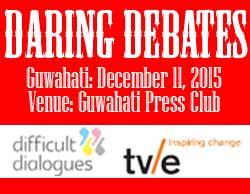Difficult Dialogues is an independent, non-partisan forum for discussing critical issues concerning lives of billions in South Asia. Curated as an annual festival of topical ideas and motions, it is premised on the conviction that knowledge sharing is the cornerstone of progressive change in this fast growing, yet highly volatile region of the world. Banking, Finance and Civil Society are the three focus areas this year. The core programme of panel discussions between experts, scholars and senior academics will result in a series of papers to inform governmental policy as well as civic body interventions.
The 2016 edition of Difficult Dialogues is being curated by the South Asia Centre, London School of Economics (LSE) and Television for the Environment (tv/e) - South Asia. The forum will have three components – LSE India Summit, tv/e Dialogue Derivatives and Daring Debates.
Some of the important people coming for the summit include: Arvind Subramaniam, Chanda Kochhar, Craig Calhoun, Erik Berglof, Jason Burke, Mridula Sinha, Nasser Munjee, Pavan K Verma, Pratap Bhanu Mehta, Raghuram Rajan, Sam Pitroda, Shashi Tharoor, Shivshankar Menon, Siddharth Varadarajan, Srjda Popovic, Sukhadeo Thorat, Urjit Patel, Yashwant Sinha, Yogendra Yadav.
What is Daring Debates?
In the lead-up to the first edition of Difficult Dialogues, we are organising Daring Debates across five cities in India - Mumbai, Delhi, Kolkata, Goa and Guwahati. Being curated by Television for the Environment (tv/e), this series of debates aims to bring students from different strata in the discourse of civil society. Daring Debates is an initiative to promote discussions around notions of being civilised in contemporary India; its implications on democracy and responsibilities of citizenry in a society that is looking inward as much as outward. The Debates will take place in Mumbai, Delhi, Kolkata, Goa and Guwahati. The Guwahai edition will be held at Guwahati on December 11.
The topic for the debate: “Can Civil Society Advance Social Change” will be contested between various teams each consisting of two members - one speaking for, and other against, the motion. Students from various colleges will be competing at their assigned venues in their respective cities. The winning team/duo from each city will be travelling to Goa to battle once more for the finale at Difficult Dialogues to be held in International Centre of Goa on January 30, 2016 featuring senior administrators, experts and scholars.
Format of the Debate
- The debate is open to graduate and post- graduate students.
- A team comprises of two members each ‘for’ and ‘against’ the motion
- Each team gets 10 minutes (5 minutes for, and 5 minutes against the motion); and 5 minutes in all for a rebuttal.
- The debates will only be in English.
A primer on Civil Society
Civil society is seen as a social sphere separate from both the state and the market. The increasingly accepted understanding of the term civil society organizations (CSOs) is that of non-state, not-for-profit, voluntary organizations formed by people in that social sphere.
This term is used to describe a wide range of organizations, networks, associations, groups and movements that are independent from government and that sometimes come together to advance their common interests through collective action. Traditionally, civil society includes all organizations that occupy the 'social space' between the family and the state, excluding political parties and firms. They usually have a formal structure, offer services to people other than their members, and are, in most cases, registered with national authorities.
The World Bank has adopted a definition of civil society developed by a number of leading research centers: “the term civil society refers to the wide array of non‐governmental and not-for‐profit organizations that have a presence in public life, expressing the interests and values of their members or others, based on ethical, cultural, political, scientific, religious or philanthropic considerations. Civil Society Organizations (CSOs) therefore refer to a wide array of organizations: community groups, non-governmental organizations (NGOs), labor unions, indigenous groups, charitable organizations, faith‐based organizations, professional associations, and foundations”.
Civil society provides the most effective platform for broad-based action and redressal of grievances worldwide. Does civil society, then, render a unique dynamism to Indian democracy? Are there long term changes through civic action, and benefits to society? Should there be a common platform for civic action of all types and sorts in a country as diverse as India? Panelists will discuss these headlong – through academic analysis and the experience of grassroots activists.
Awards: Two winners from each city will get tickets to battle in the finale of Daring Debates on 30th January, 2016 during the Difficult Dialogues at the International Centre of Goa. City winners will also receive gift vouchers and certificates.
For registration and inquiries, please email: editor@assamtimes.org
- 9392 reads










Add new comment